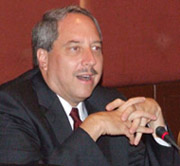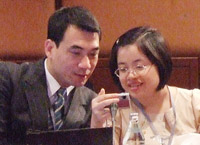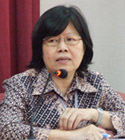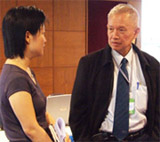Harmonizing Regulatory Practices Across APEC: Good Clinical Research Inspection

No longer are drug companies restricted to operating within the borders of a limited regulatory environment. And as a result protecting human research subjects from any harm can be a challenge. That's why APEC economies got together in Bangkok to discuss good clinical research practices (GCP) and how to harmonize standards and their implementation across the APEC region.
The pharmaceutical industry has globalized tremendously, particularly from the mid to late 1990s. That has led to a number of issues that are very pertinent to the way clinical research is seen by both governments and industry.
"Certainly there are a number of factors as to why the pharmaceutical industry as well as clinical research have globalized. Many of these are economic, including intellectual property protection and the growth of a global middle class. But there has also been broader government recognition of the benefits of clinical research in promoting public health and advancing medical science," said Dr. David Lepay, the U.S. Food and Drug Administration's Senior Advisor for Clinical Science.
Globalization of the industry happened fairly quickly through corporate expansion and mergers, creating worldwide networks for product sales. Developed countries facilitated this change.
Industry began to realize that for credibility purposes there was a role for regulatory authorities to have a certain level of sophistication within the countries in which they were placing clinical trials. And governments in both developed and developing countries understood the need to protect the rights and safety of their populations. To encourage industry and ensure the quality and ethical conduct of clinical research, governments and industry recognized the need to establish and implement international standards.
As the International Conference on Harmonization of Technical Requirements for Registration of Pharmaceuticals for Human Use (ICH) took hold in the 1990s, standards were first set for developed countries, including the European Union, Japan, and the United States.
"But clinical trials could also be accepted by the Food and Drug Administration (FDA) from outside the US, the European Union and Japan. So there was a growing interest from industry in establishing bases in other countries, especially in the developing world, not only to create a marketing presence but also to place clinical studies. Companies found many economic reasons for this expansion including active encouragement by many governments. There was also the perception that research subjects were easier to find and enroll and perhaps there was less regulatory control in place than in developed countries," said Dr. Lepay. "More and more studies were thus being placed in an increasingly larger number of countries."
APEC member economies have been important contributors to this growth. Pharmaceutical firms across APEC member economies have developed promising new drugs whose markets are not limited to the economy in which they are developed.
"Companies like U.S.-based Astra Zeneca and Pfizer and Swiss-owned Roche already have research and development facilities in Ho Chi Minh City and are now subject to Viet Nam's regulatory authority," explained Dr. Nguyen Ngo Quang who is Viet Nam's Ministry of Health's Secretary of the Science and Ethics Committee.

The situation is similar in Singapore. "We would like to develop a good in-house system to ensure safety of drug development for companies like Pfizer and Eli Lilly who have sites in Singapore," agreed Mr. Foo Yang Tong who heads Singapore's Health Science Authority's Clinical Trials pision.
So the GCP principles set forth through ICH for developed countries have become increasingly adopted as global standards, assimilated into other international guidelines, and incorporated into national laws and regulation. These GCP standards reflect internationally accepted ethical and quality principles and build on many other documents accepted by the international community.
Laws and regulations, reflecting international GCP standards for the conduct of clinical research, are now in place in most APEC economies.
"Our laws speak of where we want to go. The GCP is the gold standard and tells us what we have to do to get there," said Mr. Miguel Gonzalez Guerra, Chilean Institute of Public Health.
"These practices are the way to proceed in order to carry out clinical trials because what Chile does is sell the security or give security to the pharmaceutical companies so that the research is of good quality and the data is absolutely valid."
For pharmaceutical watchdog agencies, the GCP establishes legal frameworks; licenses medical professionals and provides mandates to regulatory authority. Laws and regulations for GCP are important first steps, but the implementation of these laws and regulations is a critical and continuing challenge. Regulatory oversight and inspection is a key part of this implementation.
"As recently as 1999, when the U.S. Food and Drug Administration went to conduct GCP inspections in Australia, we had requests from the Therapeutic Goods Administration, Australia's regulatory agency for medical drugs and devices, to accompany us as observers because they didn't yet have any authority to conduct their own GCP inspections in Australia," said Dr. Lepay.
GCP implementation and inspection were the major themes for the training in Bangkok; however the workshop also showed how each economy differentiates itself in its current implementation. For example, Indonesia has legislation in place, training has been provided, and inspections are underway.
However, while the Philippines has started conducting GCP inspections they are still working on legislation.
"In the absence of our own official guideline or standard operating procedure on Good Clinical Practice, we currently adopt international standards like the ICH Harmonized Tripartite Guideline and supplemental WHO guidance," said Wenzel Cabotage Asprec, a drug regulatory officer with the Philippines' Bureau of Food and Drugs.
"Unfortunately, our current human resources are limited so site inspections are only confined to Bioequivalence testing centers. As multi-center clinical trial sites for Investigational New Drugs are not regulated yet, the responsibility of ensuring that the clinical trial is conducted, recorded, and reported in accordance with the approved study protocol, SOP and GCP, is largely delegated to the sponsor."
Seeing a need for building the technical skills for the Asia-Pacific region's regulators, Thailand's Food and Drug Administration undertook an APEC project to train regulators in Good Clinical Practices and the implementation of GCP.
"In Thailand, it's hard to change the law but we are in the process of changing the ministerial notification. The new law will indicate broad policy but this workshop can help us develop the standard operating procedure templates for regulators and inspectors," said Ms. Akanid Wapeewuttikorn of Thailand's Food and Drug Administration who organized the project.
"This workshop demonstrates how to conduct an inspection. No university can teach that. It's really hard to find a course to do this. Some pharmaceutical companies would teach a GCP audit but it's not the same. Training from experienced regulators is best.
"Regulators need to inspect for compliance with GCP and our regulations. Now, I'm prepared to conduct some theoretical training with my colleagues," she said.
Challenge
So how are the responsibilities of sponsors, contract research organizations and investigators standardized across member economies, and is there reasonable standard of practice that is recognized internationally?
While some members have put in place standards with which to review clinical trials and others have passed laws to create a legal framework for these investigations, regulatory budgets are limited and inspection infrastructures have not yet been built in many economies.
One of the successes of harmonization has been a fairly rapid acceptance of GCP standards by governments across the APEC region. While the levels of implementation vary from one member to another, every one of the economies at this workshop has adopted international GCP standards in either laws or regulations. Now, their challenge is to educate colleagues about those standards and ensure they are being followed by fully implementing the practices.
"To address these shortfalls, the Philippines' Department of Health is drafting and updating official national guidelines, allocating funds for further staff training, automating the bureau's systems and processes, and developing an online trial registry making results publicly available," Mr. Asprec further explained.
Governments recognize that companies need to remain competitive in the international marketplace.

In Thailand, Dr. Yuppadee Javroonget said that Thailand wants to make sure that its inspectors comply with international practices.
"Undertaking this training has prepared Thailand, as other APEC economies, to go through with GCP inspections which will ensure that data collected during the trials are credible," said Dr. Javroonget who heads the Thai FDA's international affairs pision.
"This is important so that reviewers know that scientific evidence supports the safety and efficacy up to an acceptable level to prove that a product can be marketed. When a pharmaceutical company develops a product during the clinical trials, companies can lose lots of money."
Ms. Wapeewuttikorn from the Thai FDA adds: "The life science product is different than other products. You need to develop the science to create the product but at the same time you need to develop the control to regulate something that may be harmful or unforeseen."
"It can also help in quality assurance to prolong the product lifespan in the marketplace. If a serious adverse event occurs within the first few years of development, investment risk will be limited," Ms. Wapeewuttikorn further explained.
Capacity building for the region's drug regulatory authorities
Organized by the Thai Food and Drug Administration and with staff from the U.S. Food and Drug Administration who are leading global experts in GCP, medical regulators from APEC member economies came together to determine how to best assure the quality and integrity of human clinical research and thereby ensure that the results of such research can be recognized by regulatory authorities across the region.
This APEC-sponsored workshop was particularly timely given the very rapid growth of clinical research in Asia and South America, with both economic and public health implications for ensuring high quality.
"From a strategic standpoint, two regions that the United States wants to work with most closely, Asia-Pacific and South America are both part of APEC. So APEC is a very good forum for organizing this program," said Dr. Lepay who has conducted similar training throughout Western and Eastern Europe, Latin America, Asia, and the Middle East.
Recognizing the ICH as an international platform for good clinical practices, member economies explored how to adapt these standards in an effort to harmonize their own practices.

Thailand's Secretary General for the Food and Drug Administration, Dr. Chatri Bangchuin, said "The objective of this program is to ensure the region's safety and to promote good clinical trials."
Added lead instructor, Dr. David Lepay, "We hope to build skills that are fundamental to inspecting. These skills include audit planning, informed consent review, data auditing, interviewing techniques and site examinations." He added, "Each of these components is akin to understanding the steps in building a house."
Clinical research ethics are an important component of GCP training; so the workshop included a discussion of the regulator's role in the informed consent process, the operation and inspection of ethics committees, the oversight responsibilities of the research institution, and culminated in a site visit to a clinical research center in Bangkok.
"As a result of this workshop, I have been able to realize that there are spaces in which we as the regulatory authority must provide information about how to select a site and how to carry out all that is related to the research. The information will help to facilitate the decisions taken by the pharmaceutical companies and the research of a patient. I go back to Chile with new tasks and new areas for investigation," said Mr. Guerra Gonzalez.
At the site visit to the Thai Red Cross AIDS Research Center, the workshop participants had the opportunity to discuss study conduct as well as ethical issues related to a clinical trial for HIV-infected children.
"As regulators, we want to make sure that ethics boards consider all the important ethical issues," advised Dr. Lepay. "Participants found how difficult it is to sometimes identify the required elements of informed consent. And with the increasing globalization of clinical trials, there are issues of language and culture to consider beyond just the technical aspects of GCP."
The site-visit host had a different perspective but still gained a valuable lesson from visiting representatives of APEC's international regulatory community.

PREDICT project leader, Dr. Thanyawee Puthnakit, who is a pediatrician with the Thai Red Cross AIDS Research Center declared that the study team became more aware about the process of FDA inspection and what regulatory authorities are looking for.
"We learned about each inpidual economy's concerns. I think that for the participants for each regulatory environment, it's good for them to learn about the GCP standards and to learn about the regulatory environment for a specific economy in order for them to understand how to conduct inspections," Dr. Puthnakit concluded.
Benefits to the region
Some call APEC a talk shop. And while that's true at many levels it shouldn't be interpreted as a negative critique. APEC provides a platform for the region's officials to share information in a non-threatening environment - and that's important for regional diplomacy, especially when frank discussion is necessary for building regional capacity.
Whether senior officials are discussing policy that concerns regional integration or at the working level, regulators share information about developing standard operating procedures to help to harmonize standards to make it easier for companies to invest and sell their products in foreign markets.
Attracting companies to conduct new drug studies is still lucrative. For some economies, these studies help create good paying, high technology jobs. Evidence-based clinical studies help regulators to assure the safety and efficacy of marketed drugs and optimize conditions of their use for the local populations. It also means that patients will have quicker access to these drugs, thus improving an economy's collective health.
"While we have come a long way in developing our Good Clinical Practices, this workshop provides us with a good opportunity to share information with our peers to help bring them up to a standard that would increase their competitiveness," said Joyce Wang who serves as the Bureau of Pharmaceutical Affairs' Section Chief at Chinese Taipei's Department of Health.
"Providing best practices to our colleagues in other economies will raise the quality of drugs, speed approval processes and bring more drugs to market and more quickly address patients' needs."
It's important to note that multinational corporations are not the only beneficiaries.
"Thailand has some clinical trials that are conducted through universities and institutions," said Ms. Wapeewuttikorn.
"We can increase awareness of GCP among research groups focusing on herbal products and traditional medicine. We can inspect any clinical trial, not only those of multinational companies. By working with small and medium-sized enterprises we encourage their competitiveness," she added.
In the end, consumers benefit as a result of good clinical practice inspections: data credibility is more sound and patients' rights and safety are protected.

